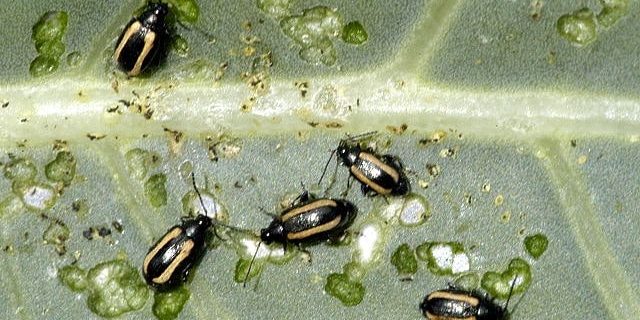As spring approaches avid gardeners are getting ready to plant their favorite crops. However, garden pests are also preparing for the feast of their lifetime as an abundance of food will be presented to them in the form of our beloved plants. Flea beetles are one of these pests that can do a lot of damage in our gardens. They overwinter in our garden beds and wake up just in time for the first spring plantings.
Identifying Flea Beetles
Flea beetles come in a lot of varieties depending both on location and types of plants they prefer. They are quite small typically ranging in size from a 1/8 of an inch to 1/4 of an inch long. They also come in a variety of colors and patterns. The main thing that distinguishes flea beetles from other garden pests is their ability to jump. Like flea’s, flea beetles will use their strong back legs to jump away from anything they see as a threat.
What Damage Do They Cause
Because flea beetles are so small and so good at jumping, they can be very difficult to find. So, most gardeners find it easier to identify this pest from its damage rather than finding an actual flea beetle.
Adult flea beetles eat the leaves of our plans. It’s easy to identify when your garden is being affected by flea beetles because of the pattern in which they eat the leaves. They leave small holes, called shotholes, in an unorganized lace pattern on your plants.
Typically, on an established plant this isn’t a huge cause for concern. This is because these larger more developed leaves can handle the small amounts of damage done. On younger plants with more vulnerable, less developed leaves, flea beetles can cause a lot of problems. Unfortunately, flea beetles are becoming most active right as we are preparing to plant our brand-new crops that may not survive the damage.
How to Prevent Flea Beetles
As with any other pest, the best way to deal with them is to prevent them in the first place. That’s why it’s important that gardeners know about flea beetles and can prepare their gardens before planting any crops. There are several different ways that gardeners have found to prevent and treat their gardens for flea beetles.
Tilling
One way to deal with flea beetles is all in how you prepare your garden. By tilling both at the beginning and at the end of the growing season you can disrupt the overwintering patterns of these beetles and reduce the number of pests in your garden for following years.
Trap Crops
Trap crops are used as a sacrificial plant to protect our main crops. These are typically planted around the exterior perimeter of our garden and give a barrier to our main plans. It’s important to regularly monitor trap crops for any signs of flea beetle damage so you can act quickly before they spread to your main crops.
Diatomaceous Earth
Diatomaceous earth is one of the best weapons against garden pests. Although it will turn your entire garden white for a bit, it can single handedly make the difference between a losing battle and quickly taking care of a developing problem. It’s best to sprinkle diatomaceous earth around the base of your plants and on top of any main crops you want to protect. To be most effective against flea beetles, it’s important to apply it two to three times per week.
Transplant Timing
Another way of preventing flea beetle damage to your crops is by carefully planning when you transplant. These young plants are the most vulnerable to flea beetles so taking care in transplanting can help keep them healthy and thriving. There’s two ways to do this, you can either plant early on in the season or wait a few weeks until your plants are stronger.
Planting early in the season means planting as soon as the last threat of frost passes. This is beneficial because it allows these seedlings to strengthen before flea beetles are out and ready for a feast. Waiting a couple of weeks is also an option. This means that the flea beetles have already begun their search for food and not found any. You can then transplant your more mature seedlings and deal with fewer flea beetles.
As all gardeners know, gardens are very rewarding but take a lot of work. Flea beetles and other garden pests just make our jobs a little bit harder. With the proper knowledge and preparation, you can avoid dealing with flea beetles, their damage, and the frustration they cause while reaping the benefits of a healthy garden.







